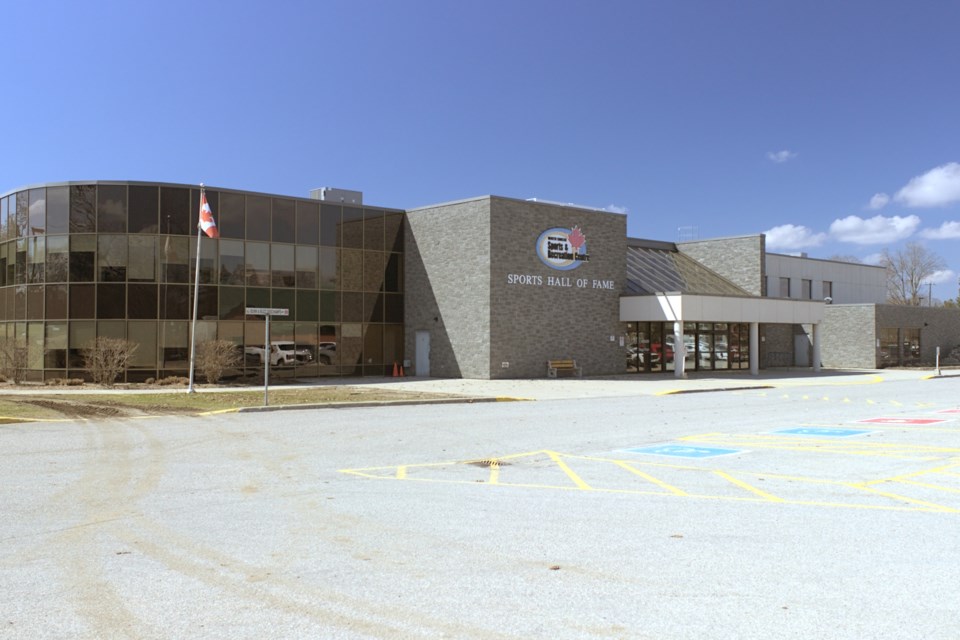The north Simcoe portion of the North Simcoe Sports and Recreation Centre was put to the test this week as a working group met to figure out how to keep the Midland facility running through its $1.8 million annual operations cost.
Although they are seemingly united as neighbours, long-standing agreements have been strained since the recent terms of councils for Midland, Penetanguishene, Tay Township and Tiny Township took residence in 2022. Whether for arenas or libraries, non-resident user fees are at the core of many disputes across the region as municipal heads try to justify providing their communal services borne through payments by their individual municipalities.
While the Midland Centennial Arena was built in 1978, additional construction around the old arena made the NSSRC a multi-purpose facility that was opened to the public in 2004.
A February report by Midland staff laid out the fees associated with running the sports centre, and council had approved a working group consisting of key stakeholders and participants as well as representatives from local municipalities.
The three-hour event on Monday was moderated by Lockhart Facilitation Inc. president Erik Lockhart, and attended by key users of the complex.
The Askennonia Seniors Centre and the Boys and Girls Clubs of North Simcoe were the non-sports participants while the Midland and Penetanguishene Ball Hockey Association, Midland Lacrosse, Midland Minor Hockey Association, North Simcoe Girls Hockey Association, and the Penetanguishene and Midland Basketball League represented the local sports community.
As described on the personal website of Midland Mayor Bill Gordon following the working group, a sombre mood changed to optimism as the participants collaborated to rank options which would be compiled into a future report. Gordon noted that favoured options included some that would “negate non-resident fees and help bridge that $55,000 funding gap”.
Attending the meeting from municipalities were members of Midland, Penetanguishene, and the Township of Springwater; declining to attend were Tay Township and Tiny Township.
Council members of Tay Township had recently scoffed at the invitation to attend, noting it would send ‘a clear message’ for the ‘albatross’ hung to Midland, and reiterating their overall opposition to non-resident user fees.
Tiny Township also declined to attend, and was contacted by MidlandToday for their reasoning.
Tiny Mayor Dave Evans replied: “The Town of Midland invited user groups of the NSSRC such as minor sports clubs and associations to a working group meeting. The Township of Tiny is a municipality, not a user group of the facility, and therefore did not attend this working group session.”
When asked how Tiny contributes to the NSSRC currently, Evans responded by noting that Midland is a designated growth node in the Provincial Policy, and as such are able to seek commercial and industrial businesses and new employment lands; conversely, Tiny is unallowed to focus on commercial or industrial growth.
“Residents of Tiny subsidize Midland’s commercial and industrial tax base through patronage of businesses in Midland for meals, activities, shopping, and private services,” stated Evans. “In 2023, Tiny collected approximately $160,000 in commercial and industrial taxes, while Midland collected over $6 million.”
Evans added that while Tiny had contributed over $350,000 to help subsidize the cost of the 20-year-old complex since opening, they had “no opportunity to provide feedback into the programming, administration, or user fees of the centre”.
MidlandToday reached out to Gordon for comment on non-participation by Tay and Tiny at the working group, with a response respecting their rationale.
“I respect their autonomy and their decision,” noted Gordon, “however, their absence was felt by all the groups in attendance who have many participants from those two communities and I believe this was a missed opportunity to be part of a solution to help keep an asset that so many of their residents use economically sustainable.
“In simple math, if both Tiny and Tay paid $30,000 yearly towards the NSSRC, this would negate the deficit and any need to pursue additional fees for their residents to access the facility. When spread across their ratepayers, the costs are minimal. However, this is entirely in their hands and I don't expect to influence their autonomy in doing what they feel is in the best interest of their ratepayers.”
Gordon pointed to the funding agreement between the town and Tiny Township regarding Midland Public Library non-resident user fees as a positive example that could be implemented.
“I would expect that the only catalyst for a change in position would come from pressure exerted by their own ratepayers who seemed eager to pay a few dollars more in their own taxes to support a structured funding agreement which would negate Midland's $55,000 funding shortfall and the need to explore additional fees,” wrote Gordon.
Thanks were given by Gordon to the participants in the working group for their attendance. Midland council is expected to receive a report in May on choices from the working group.
